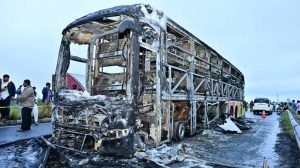No policy for the farmer
When you get a headache because of urban venality — garbage, meaningless violence, (someone abused me for not blowing the horn of my ca...

When you get a headache because of urban venality — garbage, meaningless violence, (someone abused me for not blowing the horn of my car yesterday) or just plain old vulgarity — drive in any direction for anywhere upto a hundred or more kilometers and then go into the village. You will feel good. In this weather, it is all green. If you are in Gujarat or parts of Maharashtra, it has also rained the way it hasn’t for quite some time.
What does it mean? The discomfort and the losses are largely over. Rain gives life-giving water. It is fun to see how the farmers react to the deluge. For this season, at least, their water problem is solved. In fact, they have water to spare. In Gujarat, it is as if the Sardar Sarovar water has already come. From the highway, you see paddy or dangar as it is called locally. Actually I haven’t seen so much of paddy for quite some time. But in villages away from the highway, or in the farms of better-off farmers, they are growing a lot of vegetables, pulses, jowar and castor this year.
They are all Patels here and an occasional OBC or Bakshi panch as we call them. If you have money here, you are growing Bt cotton. Names cannot be mentioned for it is all without receipts and the “local variety” of Bt. It is amazing how we implemented the first green revolution with a seed revolution in which the foundation and breeder seeds were our own, the distribution was organised and the farmer did it largely himself in what we would now call a successful public-private partnership. This time around, though, we call what he does illegal; there is no real support or regulation. This, after having discovered the super hybrid paddy in the early nineties after spending tens of crores.
So this is the way it will look when the Sardar Sarovar waters are all over, I speculate. But why the rice? Saheb, cotton prices are not dependable. What do you do when it does not rain? It is bajra and jowar with the limited water we can get. Also, we have to grow fodder for the cattle. This is doodhwalas territory. What were you doing ten years ago? They were growing a lot of “desi” cotton. In the colloqial, “desi” cotton is not the nondescript varieties but non Bt. In fact, in those days it was the Shankar 6 variety which was a high yielder. Desi is right, for it was the product of research by Indian scientists and not very far away at Surat. Those days are gone forever.
What is happening in areas where the water story is less undependable and the soil more suited for cotton? I ask a friend to check up in Bharuch which has black cotton soil and more rainfall and irrigation than Central and North Gujarat. They are into Bt cotton, vegetables, fruit, tree crops, including bananas, flowers and sugarcane. Reliable water is the key. Impressive as it is, it is all still on a limited scale. The explosion of productivity and profitability has not happened. If you don’t have a tubewell and money, you have not arrived.
The finance minister is reported to have made a sage statement, which FMs don’t usually make, to the effect that the economy is doing famously, but we don’t fully know what to do in agriculture. If he said so, he is on the dot. We have to do a lot of small things when we get out of foodgrains and we have to do the small things on a massive scale. It can’t all come from North Block or Krishi Bhawan, but economic policies to make farming more profitable have to emerge from there. Technology is important; credit, prices and tarrif rates make the difference. If the oilseed farmer has to get more, tariff rates may still have to go up since half our oil is imported and the fight against inflation will have to be more severe elsewhere. If cotton tariffs have to rise, the garment exporter will need setoffs of an automatic kind in this very critical year for him. Economics is a dismal science and there are no free lunches. But the farmer should not be expected to take on all the costs of reform.






- 01
- 02
- 03
- 04
- 05

























